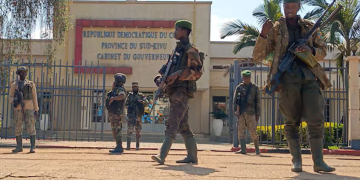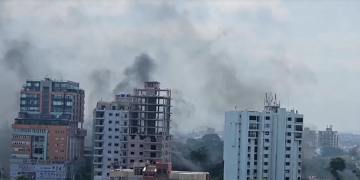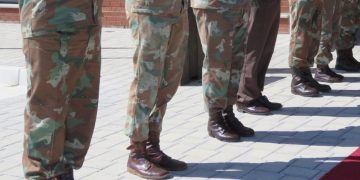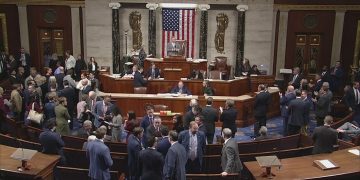The highly anticipated trial of 40 prominent Tunisian opposition figures, including politicians, lawyers, media personalities, and business leaders, began on Tuesday at the Tunis Primary Court. The defendants face charges of “plotting against state security” and “belonging to a terrorist group,” accusations that could lead to severe penalties, including capital punishment.
The courtroom was packed with lawyers, journalists, and politicians, while protesters gathered outside chanting, “Freedom, Freedom and No to Judiciary by Instructions.” Security was heightened around the courthouse as tensions flared between supporters of the accused and those backing the government crackdown.
Remote Proceedings Spark Outrage
Nine detained defendants were notably absent from the courtroom, as judges opted for remote sessions—a decision widely criticized by defense lawyers and activists as undermining fair trial standards. Only those released on bail were allowed to attend in person. Families of the detained demanded transparency and insisted on the physical presence of all accused.
Lamia Farhani, a member of the Defense Committee for the Detainees, expressed outrage: “The greatest irony is that at the helm of power sits a president, a constitutional law expert, who casually violates the very laws he swore to uphold. This hypocrisy will ultimately vindicate the detainees.”
Public Opinion: A Nation Divided
The trial has deepened political divisions in Tunisia. Protesters outside the courthouse decried what they called a politically motivated crackdown targeting dissenting voices. Ahlem, one demonstrator, said: “I came to stand with those detained for their opinions—those kidnapped and held beyond legal procedures and timelines. We reject this farce of a trial that bars the accused from facing their judges directly.”
However, not all Tunisians oppose President Kais Saied’s actions. Mohamed, a fish vendor in Tunis, blamed the defendants for Tunisia’s economic struggles: “I hope they get life sentences. They ruined us. Twenty dinars used to fill our baskets; now 100 dinars aren’t enough. Half the nation is jobless. They lied, stole, and fled.”
International Condemnation
The trial has drawn sharp criticism from international human rights organizations. Amnesty International and Human Rights Watch have condemned it as part of a broader pattern of repression under Saied’s government. Critics argue that Tunisia’s security laws are being weaponized to silence opposition voices.
In a letter from his prison cell, prominent defendant Jawhar Ben Mbarek called the trial “judicial harassment” aimed at “the methodical elimination of critical voices.” Defense lawyers have also denounced the case as baseless and lacking transparency.
Broader Context: Tunisia’s Democratic Backslide
Since President Saied’s controversial power grab in 2021—when he suspended parliament and began ruling by decree—Tunisia has faced mounting accusations of authoritarianism. Once celebrated as a democratic success story after the Arab Spring, Tunisia now finds itself grappling with eroding freedoms.
The trial comes amid worsening economic conditions in Tunisia. Inflation has surged, unemployment remains high, and access to basic goods has become increasingly difficult for many citizens. Negotiations with international lenders like the IMF remain stalled due to concerns over political instability and structural reforms.
What Lies Ahead?
The court is expected to hold periodic sessions in the coming weeks. Analysts warn that this trial could have lasting implications for Tunisia’s political trajectory. For now, calls for transparency and fair proceedings continue to grow louder as protests persist across the country.
While some see this as an essential crackdown on corruption and instability, others fear it marks another step toward authoritarian rule in a nation struggling to uphold its democratic ideals.












